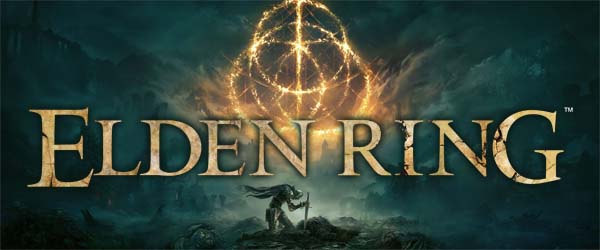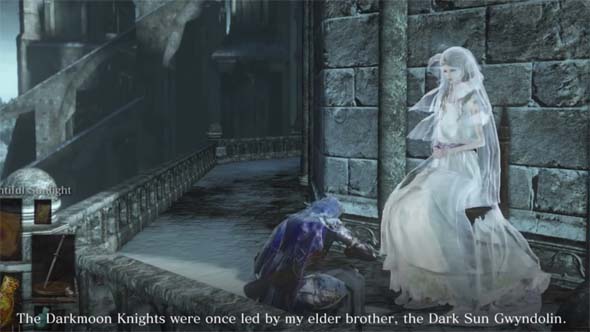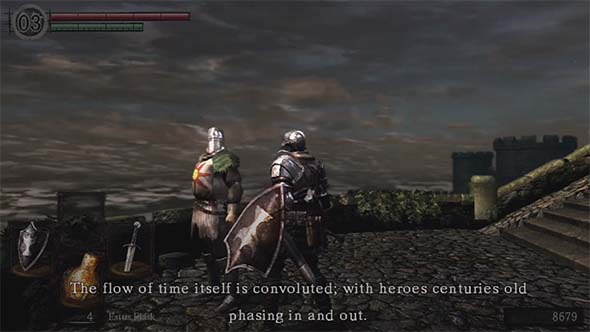At the top of my list of favorite game franchises, sits 2 seemingly unlikely companions: one is the first 4 Silent Hill games developed by Konami's internal "Team Silent" studio; the other is the series of "Souls-Borne" games created by From Software. If these 2 franchises are not my number 1 and number 2, respectively, then they are both definitely in my top 3, with Sid Meier's Civilization being the only other real contender.
On the surface, Silent Hill and the Souls-Borne games don't seem to have a lot in common, nor would one necessarily think that they would appeal to overlapping audiences. In some senses, it would seem that they couldn't be further apart. Silent Hill is a series of slow-paced psychological horror games with linear narratives, that emphasize puzzles and encourage the player to run away from threats and avoid the games' poorly-developed combat mechanics. The Souls-Borne games are frenetic action-RPGs that barely have any plot at all, and which are built entirely around combat mechanics, and which are infamous for their difficult gameplay. But despite the radically divergent styles of gameplay that these 2 franchise offer, they both contain similar themes and are open to similar artistic interpretations, which appeal to me, personally because of a particular aspect of my core beliefs and identity.
You see, I'm an atheist. More specifically, I consider myself to be a "strong atheist", "anti-theist", and "secular humanist", among other labels. Not only do I not accept any of the various god-claims due to insufficient evidence; I also positively believe and assert, with confidence, that there are no gods at all. Now, I'm sure that I've just invited a slew of commenters who will try to convert me or share their beliefs for why their personal god is real, but I'm not here to argue about the theology. Besides, I've pretty much heard it all. Not just on the internet, but also from extended family. God of the gaps, personal incredulity, watch-maker, Pascal's Wager, Kalam and other various Cosmological Arguments. I've heard it all -- or at least most of it. And I reject it all.
I am as confident in my belief that there is no god, as I am in my belief that there is no Santa Clause (and for many of the same reasons). So unless you think you can convince me that Santa Clause is real, you're probably wasting your time trying to convince me about your god.
View this entire essay in video format on YouTube.
But my atheism goes a bit further. I'm also an anti-theist, and I believe that religion and religious institutions are also dangerous and do more harm to society than good.
And based on my own personal reading of both Silent Hill and the Souls-Bornes, it seems that both game franchises kind of agree with me. [More]
e41c0e7e-50b9-4d3d-ad3d-eedbb712815d|10|2.1
Tags:atheism, religion, god, faith, Silent Hill, From Software, Demon's Souls, Dark Souls, Bloodborne, Elden Ring, Star Trek, original sin, Christianity, Judaism, curse, Way of White, Healing Church, blood ministration, orphanage, cult, abortion

Elden Ring is winning "Game of the Year" awards left and right. Critics and players are almost unanimously praising From Software for successfully adapting its Dark Souls design into an open world in its latest release. And I have to say, it is, indeed, one of the better open worlds that I've seen.
But you know what? I always kind of considered Dark Souls to be an "open world" game in all the ways that matter. I even brought it up as an example in previous video essays about open worlds. So as far as I'm concerned, Elden Ring isn't really doing a whole lot that the original Dark Souls wasn't already doing. Elden Ring just does more of it and is less subtle in its approach.
This entire essay is available in video format on YouTube.
Why do I consider Dark Souls to be a practical open world? Well, first and foremost, most of the world of Dark Souls is seamlessly connected. Almost every landmark that you can see in the distance is a place that you can (and probably will) actually go. This is also largely true of FromSoft's other games, including Bloodborne and Sekiro. The first 2 Dark Souls games, as well as Demon's Souls are also open to a lot of significant sequence-breaking, allowing players the option to handle levels out of order, or to skip entire levels altogether.
Dark Souls most dramatically diverges from a more traditional open world (like Skyrim) by wrapping its world in a vertical helix, rather than stretching it out over a flat plane. From Firelinek Shrine to the depths of Lost Izalith and Ash Lake, to the heights of Anor Londo and the Duke's Archives, Lordran is an almost completely contiguous place. But despite the narrower confines of the game's levels, there is still a sense of awe and wonder to exploring the depths of a level, only to eventually circle back to someplace familiar and slowly realize that everything in the world fits in place. It's all functional, and the relative arrangements of game levels helps to tell the story of how Lordran's world worked, and how it eventually collapsed. And now that Elden Ring has come along with a more traditional open world, it kind of proves something that I subconsciously knew all along: From Software's particular approach to story-telling is actually perfectly suited to an open world design.
Oh, and before I go on, I want to provide a minor spoiler warning for Elden Ring, and pretty much all of From Software's catalogue back to and including Demon's Souls. I will be talking about how these games deliver their narratives, which will involve talking a bit about the overall narrative structure and some thematic elements that these games all have in common. I will provide a warning for any explicit story spoilers, so that you can skip those. But if you want to go into any of these games completely fresh, then I recommend you play them first, then come back to this video.
Dark Souls's world is wrapped around a vertical helix, instead of spread across a flat plane. [More]
I recently posted a new video to my YouTube channel about my frustrations with the design of Control's "challenging" gameplay. I'm not going to transcribe the entire video here on the blog because most of what is in the video is already in my previous written review of the game.
In summary, the video compares the "tough but fair" design philosophy of From Software's games (most notably, Dark Souls) with the way that difficulty is implemented in Control. Even though I found Control to be a much easier game overall, and I suffered far fewer deaths in Control compared to Dark Souls, I did feel that Control lacked that "tough but fair" feeling that Dark Souls is famous for. Control uses a lot of seemingly cheap tricks to artificially inflate the difficulty of the game. If deliberate, then they are cheap tricks. If not deliberate, then they are faulty game design. I may not have died as often in Control, but the few deaths that I did suffer rarely felt deserved.
The full critique is available on YouTube.
The video also contrasts Control's healing system with that of Doom (2016) and Bloodborne. All three games seem to be trying to encourage fast-paced, aggressive play by rewarding the player with health for relentlessly assailing the enemy. Yet this intent doesn't come through as clearly in Control because the player needs to be close to where the enemy dies in order to pick up the health, but most of Control's action is done at medium or long range. Doom and Bloodborne, however, give health to the player when the player performs melee attacks, ensuring that even if the health is dropped on the ground as a pickup, that the player is always close enough to immediately get it if they need it.
One thing that I neglected to mention in the actual video, but which I want to add here, is that Control also has enemies with hit-scan weapons. Most enemies have machine guns that instantly damage the player if the enemy has line of sight. Attacks are not always projectiles that travel across the arena and which can be dodged, blocked, or otherwise avoided. This means that exposing yourself to crossfire is almost certain death if your health is critical in Control, and it contributes to the player needing to slow things down and play cautiously and defensively, instead of maintaining that fast-paced, aggressive play. [More]

Before we get very far into this, I want to acknowledge a point that you might be thinking right now: "But MegaBearsFan, Yorshka tells us who her parents are!" Or at least, she tells us that her father is Gwyn and her sister is Gwynevere and her "brother" is Gwyndolin. Seems pretty cut-and-dry right? OK, blog post over. If I keep writing on topics like this, I'm going to become very prolific!
... Well, maybe it's not quite that simple. This all seems rather fishy, and I'm not so sure if I'm willing to take Yorshka's words at face value. We still have the Ringed City DLC coming out for Dark Souls III at the end of this month, so it's entirely possible that DLC will settle the questions raised in this post. But until then, please humor me as I take a dive down a bit of a rabbit hole.

Yorshka directly states that Dark Sun Gwyndolin is her brother.
Before we go any further, let's take a look at what Yorshka actually says - her full dialogue can be conveniently read on fextralife (among other Souls wikis). When you meet Yorshka and perform the Darkmoon loyalty, she mentions:
"If thou shalt swear by the Covenant, to become a shadow of Father Gwyn and Sister Gwynevere,
A blade that shall hunt the foes of our lords;
Then I place thee under the aegis, and the power, of the Darkmoon."
If you level up in the covenant, she'll go on to talk about her relation to Dark Sun Gwyndolin:
"The Darkmoon Knights were once led by my elder brother, the Dark Sun Gwyndolin.
But he was stricken by illness, and leadership of the knights fell to me.
Then Sulyvahn wrongfully proclaimed himself Pontiff, and took me prisoner.
Oh where could my dear brother be?"
If you take this all at face value, then it seems pretty cut-and-dry, but take another look at the actual subtitle text. When she talks about Gwyn and Gwynevere, she uses the words "Father" and "Sister" (respectively), implying that Yorshka may be the daughter of Gwyn and blood sister to both Gwynevere and Gwyndolin. However, notice that, unlike when speaking of her brother, the words "Father" and "Sister" are capitalized, as if they are proper nouns or - more likely - titles... [More]
79ecc47f-30da-4747-ac2f-b4ec639b22b0|2|5.0
Tags:Dark Souls, Dark Souls III, From Software, lore, Yorshka, Blades of the Darkmoon, Darkmoon, Gwyndolin, Gwyn, Gwynevere, Anor Londo, Irithyll, Faraam, Nameless King, God of War, dragon, crossbreed, Priscilla, Velka, Caitha, Fina, Seath the Scaleless, Dusk, Oolacile, Oceiros, The Painted World of Ariamis, religion

Perhaps I just have a bias against parallel dimensions (as evidenced from my interpretation of Silent Hill's otherworld), but I want to take some time to clear up what might be a mis-conception in the conventional wisdom interpretation behind Dark Souls' multiplayer summoning mechanics. Dark Souls co-op is not necessarily based on parallel dimensions, as many players seem to assume. It might, in fact, be intended to be an abstraction of some kind of time travel. I've noticed that many players online already seem to refer to the multiplayer mechanic of these games in terms of time travel, but I've yet to see any wikis, lore videos, or blogs that seem to explain multiplayer as a time travel mechanic.
I want to preface this analysis by stating that I'm not asserting that the following explanation is the absolute, 100% correct interpretation of the mechanic. Individual players may disagree based on their own reading of the game, and I'm personally somewhat conflicted on the topic myself. I merely want to propose this as a possible alternative to the defacto "parallel worlds" interpretation. I'm going to point out in-game evidence that supports the idea that Dark Souls' multiplayer is based on time travel, but there is also in-game evidence and mechanical evidence that flat-out contradicts that interpretation. I will address those contradictions as well. So that being said, please keep an open mind, and enjoy the read!
The summoning mechanic
There are two games in the series that are not part of the Dark Souls franchise, and which have different in-game explanations and rules for the same multiplayer features (more or less). Those games are, of course, Demon's Souls and Bloodborne. Both have asynchronous multiplayer and summoning mechanics that work similarly to Dark Souls.
Demon's Souls summoning operates under the idea of summoning the spirit of a fellow adventurer who's soul is trapped in the Nexus. This is why you must be in soul form in order to be summoned. Bloodborne's beckoning operates [similarly] under the principle of manifesting hunters out of dreams (which seems to operate under a similar cyclical paradigm to Dark Souls, but I'm not 100% sure). In Dark Souls, you aren't necessarily summoning ghosts (as you do in Demon's Souls), since the undead in Dark Souls are more akin to zombies than ghosts. Also, characters in Dark Souls can leave summon signs whether they are hollowed (dead) or in human form (revived), which is a significant alteration from Demon's Souls. A lore reason for summoning is provided in Dark Souls:

Solaire explains to us how summoning works:
"We are amidst strange beings, in a strange land.
The flow of time itself is convoluted; with heroes centuries old phasing in and out.
The very fabric wavers, and relations shift and obscure.
There's no telling how much longer your world and mine will remain in contact.
But, use this, to summon one another as spirits, cross the gaps between worlds, and engage in jolly co-operation!"
Both Solaire's dialogue, and the White Sign Soapstone (along with other online play items) make references to other "worlds", which leads to many jumping to the conclusion that each player's game is a sort of parallel universe within the Dark Souls lore. However, this may not necessarily be correct. Both Solaire's dialogue and the soapstone also provide explanations for these worlds: "time is convoluted | distorted". This seems to be the explanation for what is meant by "worlds", and it seems that Solaire and the in-game descriptions may be using "time" and "world" interchangeably (could it be a translation / localization issue?). The phrasing in the white soapstone's description joins "the flow of time is distorted", and "the White Soapstone allows undead to assist one another", into a single, compound sentence, which definitely implies that the two phrases (and ideas) are linked.

"Online play item. Leave summon sign.
Be summoned to another world as a phantom through your sign, and defeat the area boss to acquire humanity.
In Lordran, the flow of time is distorted, and the White Sign Soapstone allows Undead to assist one another"
The dialogue of Saulden (the Crestfallen Warrior of Dark Souls II) is even more explicit... [More]
b4b5ccdc-fe67-4add-901b-a41077204778|4|5.0
Tags:Dark Souls, Dark Souls II, Dark Souls III, lore, summon, phantom, multiplayer, From Software, time travel, paradox, grandfather paradox, predestination paradox, parallel dimension, soapstone, Solaire, Crestfallen
Warrior, Crestfallen Saulden, Lautrec, Ringfinger Leonard, Anri of Astora, Sirris of the Sunless Realms, Black Iron Tarkus, Iron Golem, Anor Londo, invasion, Demon's Souls, Bloodborne
|

| 12 | | | | | | | 60 | | 11 | | | | | | | 55 | | 10 | | | | | | | 50 | | 09 | | | | | | | 45 | | 08 | | | | | | | 40 | | 07 | | | | | | | 35 | | 06 | | | | | | | 30 | | 05 | | | | | | | 25 | | 04 | | | | | | | 20 | | 03 | | | | | | | 15 | | 02 | | | | | | | 10 | | 01 | | | | | | | 05 |
|